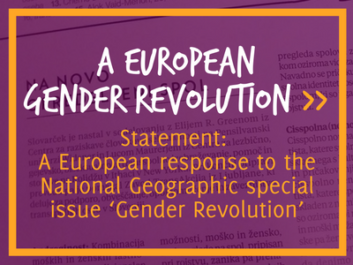Statement: European ‘Gender Revolution’

European ‘Gender Revolution’
A European response to the National Geographic special issue ‘Gender Revolution’
Transgender Europe (TGEU) calls on the National Geographic to publish a response to the European trans community who has been negatively affected by the translation, and original content in several European editions, of the National Geographic’s special issue magazine published in January 2017.
While in the USA the special issue “Gender Revolution”, along with a feature documentary of the same name, has been hailed for taking historic steps for transgender and intersex visibility in the country, the translation and/or transposition of the issue in some European countries has missed the mark. The approach to researching and consulting with trans and intersex persons and activists, which was used in the USA edition, was not applied to editions in many other countries. This has negatively impacted trans people across Europe, in particular in the Czech Republic, Hungary, and Romania.
Last week, Czech organisation Trans*parent published an open-letter pointing out problems with the translation of terms, editorial, and an interview in the magazine. In the letter trans activists state,
“A special gender issue of National Geographic in Czech would have allowed us to provide journalists with an amazing positive example when they come to us for advice. Regrettably, we are not able to do that.”
This sentiment is shared by trans people from Romania and Hungary, where the translation of the material was problematic.
Krisztina Kolos Orban, from Hungarian NGO Transvanilla said,
“This special issue on gender was a great opportunity to raise awareness in the country. Instead, it has caused a lot of confusion due to the incorrect use of terms to refer to trans issues.”
In Romania, Patrick Brăila calls the translation “unresearched”. He comments that none of the LGBTQI organisations in the country were contacted for advice, input, or comments and, as a result, “the translation is poor, particularly when it comes to gender identity.” He stresses that,
“In Romania, the trans community is invisible; for the Romanian state, I, as a trans person, do not exist. This edition of the National Geographic could have shed light onto our struggles for legal gender recognition, and could have been a step in the right direction. Unfortunately, it was not so.”
In Germany, the edition included a transphobic and sensationalist article. The organisation Bundesverband Trans* stated that,
“In his sharpened way of writing, Harald Welzer tries to be witty. Unfortunately, he completely misses the point regarding trans realities, as he is obviously completely unaware of the odyssey trans children and their families face in Germany when trying to be accepted for who they are.”
Trans organisations and activists from across Europe highlight the difference that a consultation with trans communities would have made in ensuring that the glossary and translations of terms and phrases were in line with, and correspond to, the terms being used by them in the countries. It is also recommended that expert commentary on trans issues to be given by the people most affected; trans people themselves. The difference is stark where this was done, and in Slovenia and in Croatia the edition of the magazine is being hailed as a good practice.
Anja Koletnik, from Slovenian NGO TransAkcija affirms that,
“The special issue is overall fine, and it is important that it exists and that we were included in the consultation.”
Arian Kajtezovic, from Croatian NGO Trans Aid added,
“There are positive aspects of the Croatian edition that make it better than other localised editions in Europe. Amongst these is featuring a local trans activist as an expert on the topic: giving a voice to trans people directly instead of resorting to the all-too-often-seen tendency to ask others about our experiences.”
In some European editions’ translations of the original content from English, like the glossary of terms (Hungary), has been a major setback. In others, original content has also been produced which is transphobic (Czech Republic, Germany), additionally having an editorial that clouds the issue with “anti-gender” rhetoric (Czech Republic, Romania) or editorial choices that omit the reference to gender in the front cover (France, Spain).
In the majority of the editions reviewed by the European communities, it was also found that the terms ‘intersex’ and ‘gender identity’ were translated incorrectly. For example, the international cover which shows a group of young people who identify as trans, non-binary, intersex, and other identities was used in Romania, but they have removed the word ‘intersex’ from the description of intersex activist Pidgeon Pagonis.
As it is now too late to change these editions, TGEU calls on the National Geographic to issue a response to the European trans communities in order to explain the editorial choices, translation errors, and transphobic content found within these editions. TGEU also calls on the editorial teams in Europe to reflect on the responses from the European trans communities and reach out to them to ensure progressive and well researched coverage of trans people´s lives in the future print or online editions of the National Geographic.
#Ends
Signatories
- Trans Aid Croatia
- Trans*Parent Prague
- German Federal Transorganisation (BvT)
- Transvanilla Transgender Association
- TransAkcija Slovenia
- Patrick Brăila – Trans activist, Romania
- interACT – Advocates for Intersex Youth, USA
- Pidgeon Pagonis – Intersex Activist, USA